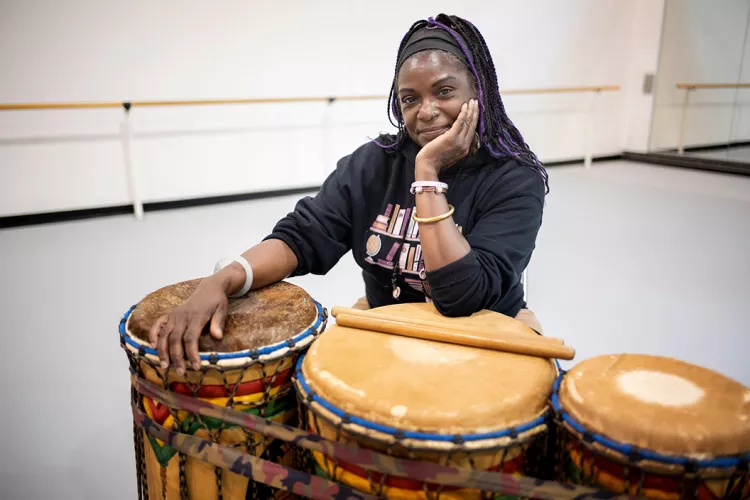Associate in Performance Jeannine Osayande Honored for Contributions to Social Justice, Equity, and Inclusion

Jeannine Osayande, associate in performance in the Music and Dance Department, recently received the Shine a Light Award from the Swarthmore Centennial Foundation, in recognition of her contributions to social justice, equity, and inclusion in her community.
For Osayande, the honor is a reflection of the many hats she wears, beyond being a part-time professor at the College. A master of African Diaspora drum and dance traditions, she is the founder of Dunya Performing Arts Company, board co-chair of the Philadelphia Folklore Project (PFP), and an oral historian through the Scribe Video “Making a Homeplace” Precious Places project, among many other endeavors.
Osayande was born in the Historically Black Neighborhood of Swarthmore, where her family has lived for seven generations. Her great-grandmother worked at Swarthmore as a chambermaid. Her father was the local chief of police, and her mother was an activist and teacher. Hard work and serendipity led Osayande to her current position. At 18, she was living in Cambridge, Mass., and planning to teach special education.
“[One night] in Harvard Square, there was this huge circle with all these people drumming and dancing,” she says. “That was my big introduction” to African dance.
She realized, “This is what I should do with my life.”
Osayande studied the choreography, pedagogy, and cultural traditions of African Diaspora dance with the Art of Black Dance and Music, becoming an expert. In 1989, she was once again living in Swarthmore and was taking a West African dance class in Philadelphia. There, she connected with a Swarthmore student who later set up a community master dance class series. Swarthmore sponsored the series through the student’s request with Osaynde in charge. The program was a success, and in the late 1990s, Osayande became an adjunct professor.
Osayande’s personal love of the art form inspires her work. Her pride in her students is evident. She spoke about Arianne Wenk ’14, who applied (and was accepted) to medical school with an essay about African drum and dance, and is now a resident physician at the University of Illinois College of Medicine, Chicago.
“Even in medicine, movement, dance, and culture can have an intersection,” Osayande says.
She speaks passionately about building ties between herself, Swarthmore students, and individuals beyond the College. When she was 9, Swarthmore’s newly established Black Cultural Center brought children from her neighborhood to campus.
“[That] big-brother, big-sister program … inspired me,” she says.
Osayande wants students at Swarthmore Rutledge School (SRS), where her company DunyaPAC teaches African Diaspora dance traditions, to have similar inspirational experiences. During the upcoming 2022 celebration “30 Years of Art in Education” at SRS, Osayande plans to invite past and present Swarthmore and SRS students to dance with DunyaPAC in a “huge celebration.”
Osayande is also committed to social justice in response to the Black Lives Matter movement. She described working in the Department of Music and Dance as the College community reckoned with the national conversation on police brutality during summer 2020 and beyond. The COVID-19 pandemic has affected the department, but “honestly, there are two pandemics,” she said, referring to the systemic racism Black people continue to face.
Osayande presented at the Moving for Justice Series and co-created the Black Dance Forms Matter symposium series. She expressed hope that multiple departments would find a way to engage with these programs. This year, Osayande will work with PFP in a new partnership at Swarthmore through Assistant Professor of Art History Paloma Checa-Gismero’s Socially Engaged Art in the Americas course, and the Lang Center for Civic and Social Responsibility.
Reflecting on the Shine a Light Award, Osayande says it inspires her to future action.
“I’ve completed all these things, but as an artist, life is a work in progress,” she says. “I can look and reflect. What am I doing ... and what do I need to do in service of social change?”



